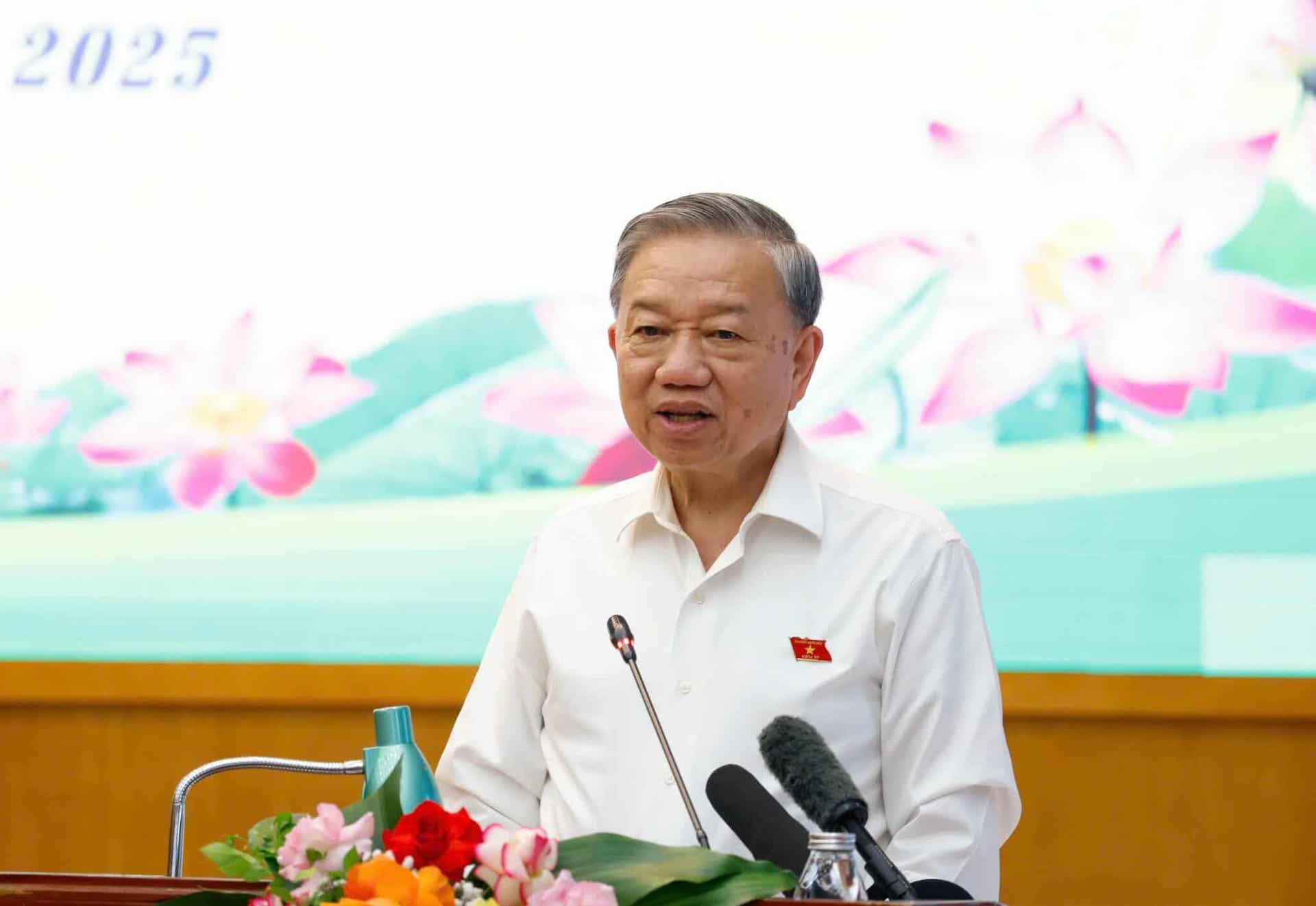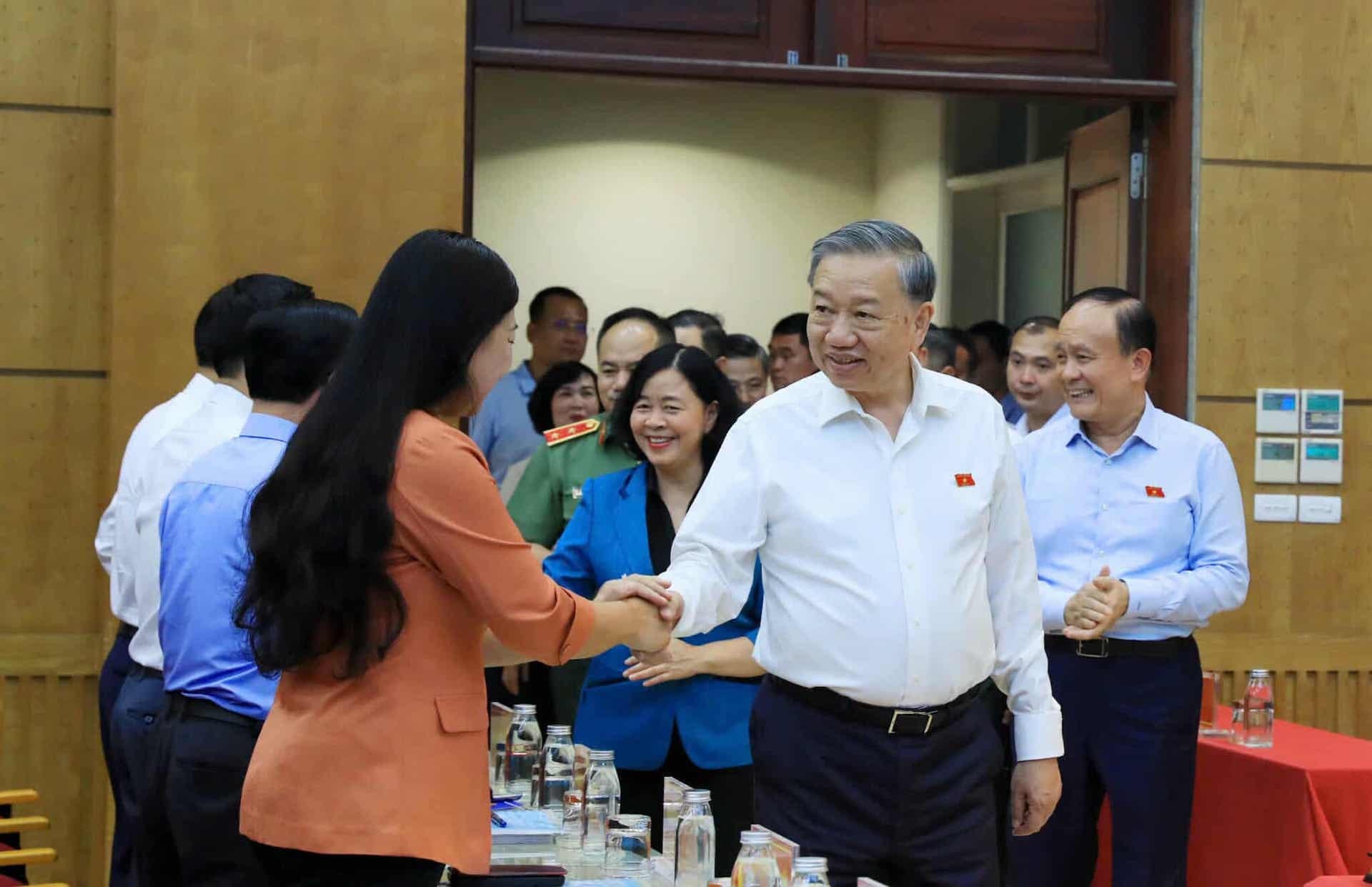General Secretary: Salary reform needs to be calculated, not 'equalized'
General Secretary To Lam emphasized that the goal of salary reform is to improve the quality of life. Therefore, the reform must be calculated, not "leveled", and must be based on job positions.
On the afternoon of September 23, General Secretary To Lam and National Assembly deputies of constituency No. 1 met with voters of Dong Da, Kim Lien, Van Mieu - Quoc Tu Giam, Lang, O Cho Dua, Ba Dinh, Ngoc Ha, Giang Vo, Bach Mai, Hai Ba Trung and Vinh Tuy wards (Hanoi) before the 10th session of the 15th National Assembly.
Don't wait for people to complain
At the conference, many voters were interested in the two-level local government model being implemented. Voter Tran Tuan Khanh (Hai Ba Trung ward) assessed that the reorganization of the apparatus has created positive changes, streamlining personnel, and improving operational efficiency. Voter Pham Xuan Mai (Van Mieu - Quoc Tu Giam ward) said that this is a correct step, receiving consensus from the people.
However, voter Nguyen Thi Bich Van (Giang Vo ward) reported that after implementing the two-tier model, public administrative service centers are often overloaded. Elderly people or people without smart devices have difficulty completing online procedures. She suggested that the city consider arranging a public administrative service center for each ward to reduce the workload for staff and make it more convenient for people.

Speaking at the meeting with voters, General Secretary To Lam said that he had personally inspected and found that administrative reform still had some shortcomings. We must change our mindset from management to creation and service. The government should not wait for people to report, but must proactively grasp and resolve people's difficulties.
"If people are at risk of hunger, malnutrition, or disease, the government must proactively resolve the issue, not wait for people to report it," the General Secretary emphasized.
General Secretary To Lam said that the goal of administrative procedure reform is to make sure that people do not need to carry documents on their person. All documents need to be integrated into citizen identification cards and transactions on the phone. Therefore, state agencies need to carefully review and remove unnecessary procedures, both to reduce the burden on officials and to save time and costs for people.
Wage reform must be linked with price control.
One of the issues that voters were interested in at the conference was the issue of salary reform in the spirit of Resolution 27 of the Central Committee. General Secretary To Lam said that the salary level is to maintain labor force and improve people's lives.
General Secretary To Lam emphasized that salary reform must be calculated, not "leveled" but based on job positions, giving priority to specific sectors and fields and difficult areas such as education, health, armed forces, remote areas or science and technology officials. Salary policy must have a specific roadmap, encouraging the right subjects to create development momentum.
Another important issue is macroeconomic management, inflation and price control. “Many times, when we hear about wage increases, market prices have already increased, causing people’s real lives to not improve,” the General Secretary noted. Therefore, wage policy is only effective when it is synchronously linked with price control and market stability.
According to the General Secretary, the goal of salary reform is to improve the quality of life. When the country grows and develops, the quality of life of the people must also be improved. Working people can support their family members, creating conditions for young couples to boldly have children, contributing to solving the risk of population aging. When salaries of officials increase, salaries of workers and retired officials also need to be adjusted accordingly, ensuring harmony, thereby contributing to social justice and promoting sustainable development.
Qualified for high school universalization
Regarding the issue of improving the quality of education and preventing brain drain, the General Secretary said that the Politburo has issued Resolution 71 on breakthroughs in education and training development, which is very important content and a pillar of national development.

According to the General Secretary, we have universalized preschool, primary, and secondary education. The General Secretary affirmed that we are now fully qualified to universalize high school. He said that he had asked the Ministry of Education and Training if there would be any difficulties if we universalized high school education.
“The Ministry of Education and Training replied that there was a lack of schools, classes, and teachers. I said that the State must take care of that and do it.
Previously, students’ families had to pay tuition fees, but now the State takes care of the tuition fees. If students graduate from junior high school but do not go to high school, what will they do? Will they just hang around? Then we will have to spend more time dealing with this problem,” the General Secretary said.
Along with universalizing high school education, the General Secretary emphasized that exams must be reduced. “Why so many exams? Too many exams are very costly, stressful and tiring for parents, students and teachers,” the General Secretary reiterated the requirement to reduce exam pressure to encourage the emulation movement in studying.
Highlighting continued educational reform, the General Secretary also mentioned further goals such as free tuition, student support, or free textbooks.
The General Secretary also said that there should be solutions to employ and attract talented people from around the world to work in Vietnam.
